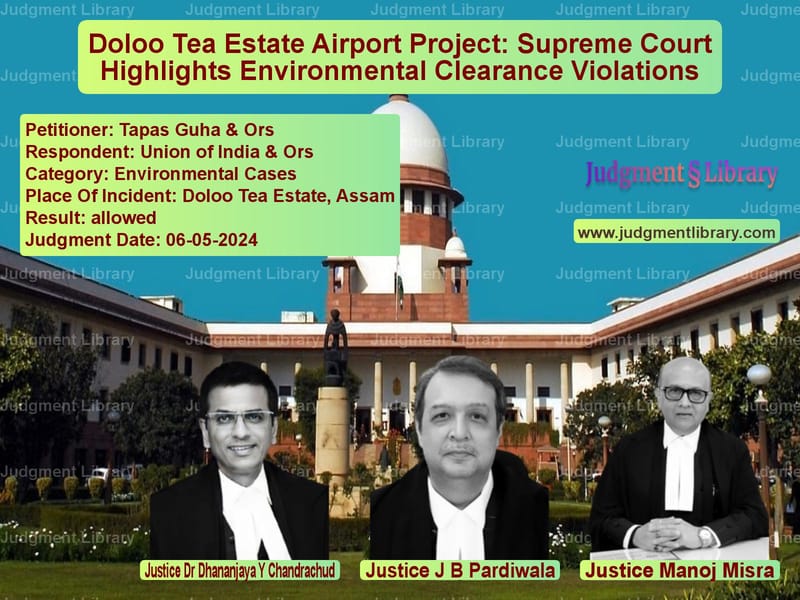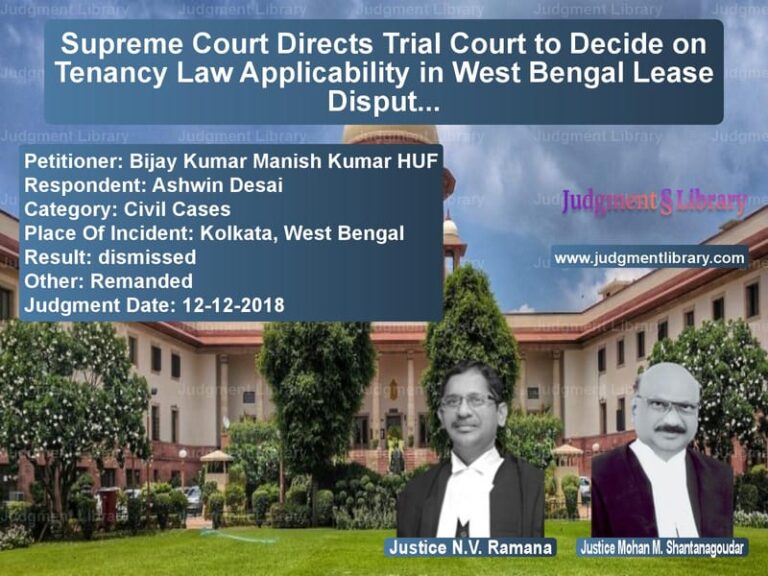Doloo Tea Estate Airport Project: Supreme Court Highlights Environmental Clearance Violations
The controversy surrounding the proposed Greenfield Airport at Doloo Tea Estate in Assam escalated into a prominent judicial issue due to severe environmental concerns and violations of regulatory norms. The case highlights critical questions about how infrastructure development should responsibly align with environmental protection laws in India. It represents a critical reminder that development and ecological sustainability must proceed hand in hand, without compromising one for the other.
Background of the Doloo Tea Estate Airport Project
The Ministry of Civil Aviation identified three tea estates—Doloo, Khoreel, and Silcoorie—in Assam for establishing a commercial airport to replace the inadequate existing defense airport infrastructure. Doloo Tea Estate was ultimately selected by the Airport Authority of India (AAI) after assessing its feasibility. The site chosen spanned a total area of 404 hectares, including an additional adjacent area of 69 hectares, containing around 173 residential units.
Arguments Presented by Petitioners
The petitioners, represented by Tapas Guha, filed a petition in the National Green Tribunal (NGT), alleging severe breaches of environmental norms. The petitioners’ arguments highlighted extensive environmental damage, claiming verbatim:
- Eviction operations led to uprooting of approximately 41,95,909 tea bushes and more than 10,000 shade trees, severely affecting local biodiversity.
- Large-scale clearance operations involving 200-250 JCBs carried out continuously over three days and nights without mandatory Environmental Clearance (EC).
- Imposition of Section 144 CrPC to facilitate eviction using approximately 1050 bulldozers and excavators to clear 2500 bighas of land.
- Violation of mandatory Environmental Impact Assessment (EIA) processes and public consultations as mandated by EIA Notification, 2006, effectively rendering such consultation impossible post-eviction.
Response from the Assam Government
Countering these claims, the Government of Assam through an affidavit submitted by the Joint Secretary, General Administration Department, argued:
- No eviction of households took place, as the site was reportedly uninhabited.
- No shade trees were felled, and any removal of tea bushes was routine agricultural practice, not requiring environmental clearance as per the EIA Notification, 2006.
The government affidavit stated verbatim:
“Removal of tea bushes occurs routinely even as part of regular tea cultivation for which no environmental clearance is required.”
Initial Ruling by the National Green Tribunal
The National Green Tribunal initially dismissed the petitioners’ plea on 25 January 2024, arguing that since Environmental Clearance had not yet been granted, the plea to restrain site clearances was premature. The Tribunal observed:
“The mere inclusion of a clause under ‘Environment Clearances’ in the form of said Notification does not deem the same mandatory for purposes of the EIA assessment study.”
Supreme Court’s Scrutiny and Key Observations
On appeal, the Supreme Court bench comprising Dr Dhananjaya Y Chandrachud (CJI), J B Pardiwala, and Manoj Misra critically assessed the arguments and evidence. Highlighting critical oversights by authorities and the NGT, the Court pointed out explicitly:
“From the material which has been placed on the record, we are clearly of the view that the authorities, in the present case, have acted in violation of the provisions contained in Para 2 of the notification dated 14 September 2006 by carrying out an extensive clearance at the site even in the absence of an Environmental Clearance.”
Additionally, the Court strongly criticized the NGT’s lack of diligence and due process:
“The perfunctory dismissal of the case by the NGT not only reflects a lack of due diligence but also demonstrates a disregard for the gravity of environmental concerns raised by the appellants. Such negligence on the part of the Tribunal sets a concerning precedent, eroding public trust in the efficacy of environmental governance mechanisms.”
The Supreme Court also rebuked the government’s affidavit as misleading:
“It is inconceivable that an organized operation involving over 200-250 JCBs was done at the behest of the tea garden workers. The affidavit of the Joint Secretary to the State Government has been rather liberal with the truth by suppressing the actual state of facts.”
Environmental Clearance Requirements Clarified
The Court reiterated the necessity for strict adherence to environmental laws:
“Environmental regulations are in place precisely to ensure that developmental projects, such as the establishment of airports, are undertaken in a manner that minimizes adverse ecological impacts and safeguards the well-being of both the environment and local communities.”
Supreme Court’s Final Directives
Given these findings, the Supreme Court issued the following directives:
- Immediate cessation of any unauthorized clearance activity at the proposed airport site.
- Environmental Clearance applications to be assessed strictly based on the condition of the land prior to the unauthorized site clearances.
- Reversal of NGT’s dismissal decision dated 25 January 2024.
Significance and Broader Impact
This landmark judgment sets a critical precedent underscoring the essential role of stringent environmental compliance in infrastructure projects. It sends a clear message to government authorities and private entities alike about the importance of upholding environmental standards and laws in development projects. Ultimately, it reinforces the commitment to sustainable development principles in the face of ambitious developmental goals, ensuring ecological preservation remains paramount.
Petitioner Name: Tapas Guha & Ors.Respondent Name: Union of India & Ors.Judgment By: Justice Dr Dhananjaya Y Chandrachud, Justice J B Pardiwala, Justice Manoj Misra.Place Of Incident: Doloo Tea Estate, Assam.Judgment Date: 06-05-2024.
Don’t miss out on the full details! Download the complete judgment in PDF format below and gain valuable insights instantly!
Download Judgment: tapas-guha-&-ors-vs-union-of-india-&-ors-supreme-court-of-india-judgment-dated-06-05-2024.pdf
Directly Download Judgment: Directly download this Judgment
See all petitions in Environmental Cases
See all petitions in Public Interest Litigation
See all petitions in Damages and Compensation
See all petitions in Other Cases
See all petitions in Judgment by Dhananjaya Y Chandrachud
See all petitions in Judgment by J.B. Pardiwala
See all petitions in Judgment by Manoj Misra
See all petitions in allowed
See all petitions in supreme court of India judgments May 2024
See all petitions in 2024 judgments
See all posts in Environmental Cases Category
See all allowed petitions in Environmental Cases Category
See all Dismissed petitions in Environmental Cases Category
See all partially allowed petitions in Environmental Cases Category







